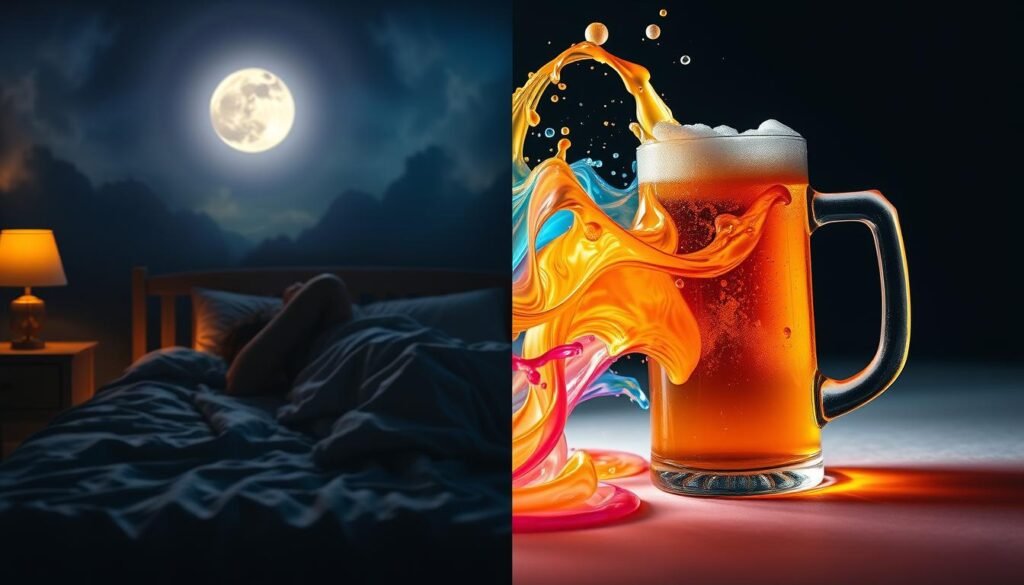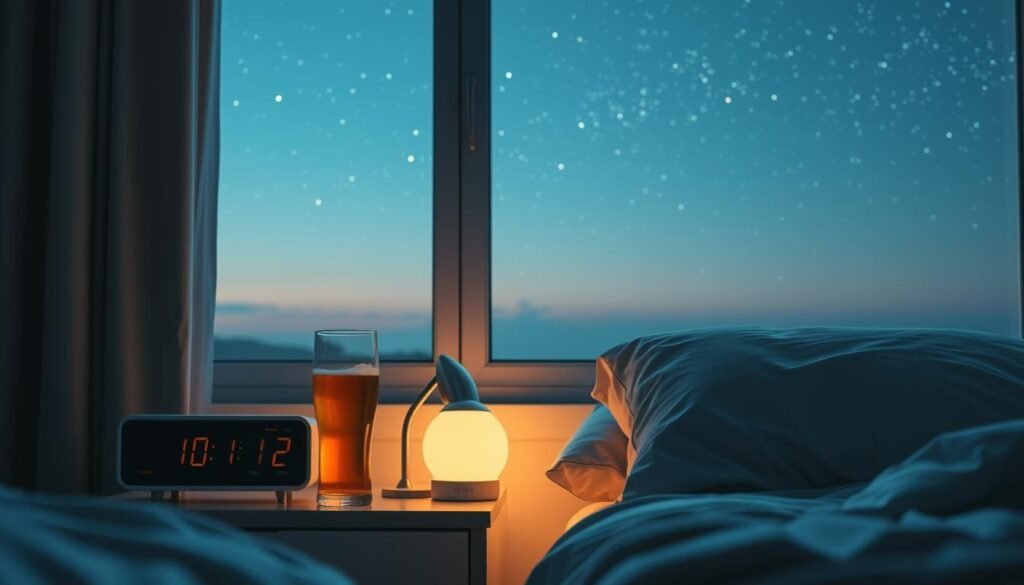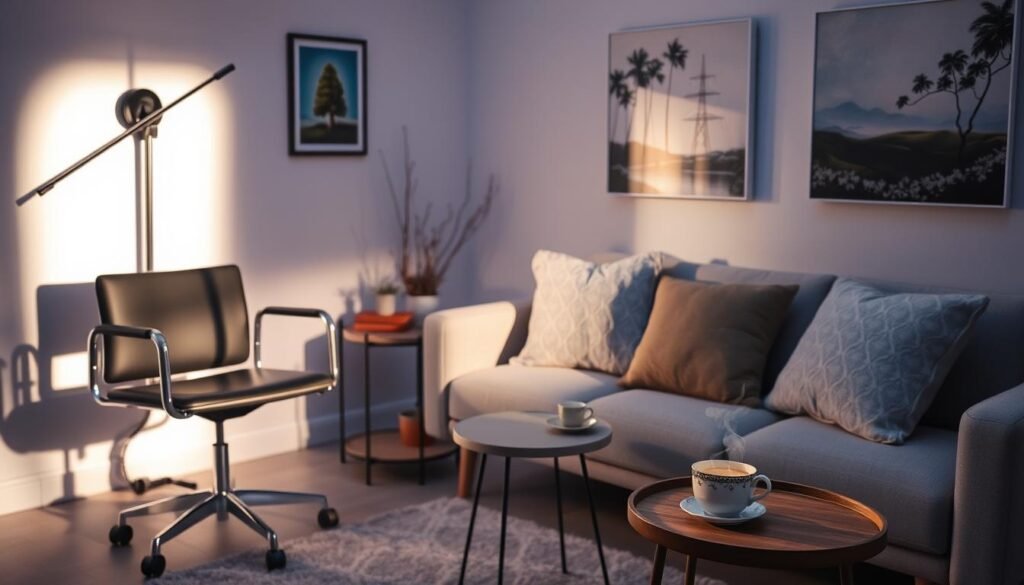Nearly 90% of people who drink alcohol in the evening have trouble sleeping. This eye-opening figure shows a strong link between drinking beer and not being able to sleep. It’s critical for the over 33% of American adults who battle insomnia to understand this impact.
Our exploration focuses on how beer leads to sleep issues. Drinking can make you feel sleepy at first but eventually messes up your sleep quality. This piece looks into sleep basics, the importance of melatonin and REM sleep, and how alcohol affects different people. We want to offer a deep understanding of sleep problems caused by beer. This way, you can wisely choose your nighttime habits.
Key Takeaways
- Nearly 90% of regular evening alcohol consumers report sleep-related issues.
- Up to 70% of people using alcohol struggle with insomnia.
- Beer consumption can lead to significant disruptions in sleep quality.
- Alcohol dependence is closely linked to sleep disorders like insomnia.
- Timing and moderation in alcohol consumption are crucial for better sleep.
- Many individuals self-treat insomnia with alcohol, complicating their sleep patterns.
Understanding Insomnia and Its Causes
Insomnia is a common sleep problem. It makes it hard to fall asleep, stay asleep, or causes early waking. People struggle with it at least three nights each week, for over three months. This issue greatly lowers day-to-day performance and life quality.
Definition of Insomnia
Insomnia causes various sleep troubles, worsening daily life challenges. Sufferers often feel exhausted, irritable, and can’t focus. This leads to more stress and poorer sleep. Knowing what insomnia is helps us understand its impact on health and happiness.
Common Insomnia Causes
Several factors lead to insomnia, including:
- Stress and Anxiety: Daily stress can keep you alert at night, making relaxing hard.
- Medical Conditions: Issues like asthma or diabetes disrupt sleep.
- Substance Use: Drinking alcohol is a big cause of sleep issues. Over 70% of people with an alcohol problem have sleep disorders.
Understanding these causes is key to managing sleep issues. For example, improving sleep quality can take 5 to 9 months without alcohol. The body takes about an hour to process one alcoholic drink, which affects sleep a lot.
Fixing sleep problems is crucial for better health. To learn more about improving sleep health by understanding insomnia and hypersomnia, check out this resource.
| Insomnia Factors | Description |
|---|---|
| Stress and Anxiety | Increased mental alertness that hampers relaxation. |
| Medical Conditions | Chronic health issues interfering with the ability to sleep. |
| Substance Use | Alcohol and drugs contributing to reduced sleep quality. |
The Relationship Between Alcohol and Sleep
The connection between alcohol’s effects on sleep is not simple. Many think drinking beer helps them relax and sleep better. But while alcohol may make you fall asleep faster, its overall effect is more harmful. Research shows long-term heavy drinking worsens insomnia.
Nearly half of the people over 65 drank alcohol last year. 30% of these folks with insomnia said they drank to sleep. Though 67% thought it helped, the long-term effects are concerning. Around 70% of drinkers may face insomnia, showing a cycle of dependency.
Depending on alcohol for sleep can cause big health problems. It can lead to stroke, obesity, and depression due to chronic sleep loss. Drinkers also have a 25% higher risk of obstructive sleep apnea, which is serious.
Men who drink over 21 units of alcohol weekly are 30% more likely to wake up at night. Women’s reactions to alcohol and sleep are less understood, needing more study. Regular drinking messes up sleep and causes tiredness during the day. Shockingly, 20% of U.S. adults drink to sleep better.
Using beer to combat insomnia traps you in a harmful cycle. It changes how the brain handles sleep, making insomnia worse. It’s important to know how beer and sleep quality are linked. This shows why we should drink less and look for other ways to sleep well. For a closer look, there’s a detailed study here.
How Alcohol Affects Sleep Quality
Exploring how alcohol and sleep quality are connected shows the sleep issues it can cause. While alcohol might help someone fall asleep quickly, it has downsides later at night.
Initial Sedative Effects of Alcohol
Many enjoy the calming influence of beer for quicker sleep. Alcohol’s sedative effect makes people feel relaxed and helps them fall asleep. This seems great in social situations or after a busy day. Yet, this initial advantage can mislead people about the sleep quality they get.
Disruption of Sleep Architecture
Drinking alcohol changes normal sleep patterns and the structure of sleep. It messes with the body’s sleep stages, especially cutting down REM sleep time. This phase is key for deep rest. Regular drinkers may end up in lighter sleep phases, causing disrupted rest. Problems like snoring or sleep apnea can also get worse. These issues not only drop sleep quality but make you more tired during the day.
| Alcohol Consumption | % Decrease in Sleep Quality | Associated Sleep Problems |
|---|---|---|
| Under 2 drinks (men), Under 1 drink (women) | 9.3% | Minor sleep disturbances |
| About 2 drinks (men), About 1 drink (women) | 24% | Increased wakefulness, snoring |
| More than 2 drinks (men), More than 1 drink (women) | 39.2% | Insomnia, sleep apnea |
The connection between beer’s effect on sleep and insomnia shows that alcohol’s quick sleep aid has a price. To have a peaceful night, think about how much you drink and its effects on your sleep.
Beer Causes Insomnia: The Science Behind It
Drinking beer can mess with your sleep. It leads to poor sleep quality due to changes in your body. These changes explain why drinking can make insomnia worse.
Impact on Melatonin Production
Beer messes up how much melatonin your body makes. Melatonin is a hormone that helps you sleep. When you drink, your melatonin levels drop, making it hard to sleep well. This means even a little beer can cause insomnia.
Alterations in REM Sleep
Studies show beer changes REM sleep, which is crucial for feeling rested. It takes longer to reach REM sleep, and you spend less time in it. This can make you feel more tired the next day and mess up your sleep habits.
Effects on Sleep Apnea and Snoring
Beer’s relaxing effects can make sleep apnea and snoring worse. Sleep apnea stops your breathing while you sleep. This increases how often you wake up at night. Drinking more beer can lead to even bigger sleep problems.

| Effect | Details |
|---|---|
| Melatonin Suppression | Alcohol consumption reduces melatonin levels, disrupting sleep regulation. |
| REM Sleep Alterations | Increased latency and decreased REM duration impact sleep quality. |
| Sleep Apnea Exacerbation | Beer can worsen snoring and sleep apnea, leading to interrupted breathing. |
The Role of Beer in Sleep Disturbances
It’s helpful to know how different beers affect sleep. The connection between beer and sleep issues involves more than alcohol. It also depends on the beer’s ingredients and style. Many studies have looked into how beer changes sleep patterns and health.
Different Types of Beer and Their Impact
Different beers affect your body in various ways. Dark beers, for example, have compounds that can change how well you sleep. Light beers may feel less heavy but can disturb sleep due to alcohol. The hops in some beers might alter melatonin, critical for sleep regulation.
Alcohol Content and Sleep Quality
The amount of alcohol in beer greatly affects sleep. Beers with more alcohol can make insomnia worse and interrupt sleep. About 70% of adults in America drink alcohol, and 10% do so daily. Knowing the alcohol levels in beer can help people choose drinks that won’t hurt their sleep. When alcohol wears off, it can mess up sleep even more.
When to Stop Drinking for Better Sleep
Knowing when to stop drinking is key for better sleep. Experts say to stop drinking three to four hours before bed. This helps reduce alcohol’s effects, like insomnia. Learning about how alcohol is broken down helps with sleep too.
Recommended Timeframes
Beer causes insomnia if drunk too close to sleeping. It’s best to stop drinking early in the evening. This helps you sleep well. A regular no-drink time before bed helps the body get ready for sleep.
Alcohol Metabolism and Its Timing
How the body handles alcohol affects sleep. The liver breaks down alcohol, and this differs from person to person. Weight and health play a role. Knowing when to stop drinking for better sleep matters because alcohol messes with sleep regulators like melatonin.

| Time Before Sleep | Recommended Action | Impact on Sleep Quality |
|---|---|---|
| 3-4 hours | Cease alcohol consumption | Improves sleep cycles |
| Every evening | Set a bedtime routine | Enhances sleep predictability |
| Ongoing | Avoid caffeine and nicotine | Reduces hyperactivity, promotes restful sleep |
| Regularly | Engage in exercise | Improves overall sleep quality |
These steps help build better sleep habits, especially after quitting alcohol. Timing alcohol right boosts sleep and health. For more details on alcohol and sleep, visit this resource.
Long-term Effects of Alcohol on Sleep Patterns
It’s important to know the difference between drinking once in a while and drinking a lot over time. This helps us understand how alcohol affects our sleep. A drink now and then may mess with our sleep for a bit. But drinking a lot for a long time can really mess up how we sleep.
Short-term vs. Long-term Alcohol Use
Drinking a little can make us feel sleepy, but it doesn’t let us sleep well. We miss out on the deep sleep and dream stages we need. But if we keep drinking over time, it might lead to long-term sleep problems like insomnia. The more we drink, the worse our sleep gets. This can lead to waking up a lot at night. We might even wake up because we can’t breathe well, thanks to how alcohol affects our muscles.
The Cycle of Alcohol-use Disorder and Insomnia
There’s a tough cycle between drinking too much and not being able to sleep. Some people start drinking to help them sleep. But then, they end up sleeping even worse. As sleep gets worse, they might drink more to try to sleep better. This can make it hard to think clearly and remember things. To get out of this cycle and sleep better, cutting down or stopping drinking can help a lot. Over time, getting good sleep again can make our overall health better.
Alternative Solutions to Insomnia
Finding effective ways to fight insomnia without alcohol can change lives. There are many alternative methods available. These focus on using non-alcoholic aids and healthy sleep routines to improve sleep quality.
Non-alcoholic Sleep Aids
Several non-alcoholic aids can greatly enhance sleep. Herbal teas like chamomile or valerian root are calming. Supplements such as melatonin aid in sleep cycle regulation. Cognitive behavioral therapy (CBT) tackles the thoughts and behaviors that hinder sleep.
Healthy Sleep Practices
Adding healthy sleep habits to your routine can boost your chances of sleeping well. Essential strategies involve:
- Maintaining a consistent sleep schedule
- Creating a comfortable and dark sleeping environment
- Avoiding stimulants like caffeine and nicotine before bedtime
- Limiting screen time and reducing blue light exposure before sleeping
- Using relaxation methods such as meditation or deep breathing exercises
These methods serve as key alternatives for overcoming insomnia. They help people develop better sleep habits.
| Aid/Practice | Description | Effectiveness |
|---|---|---|
| Herbal Teas | Natural infusions that promote relaxation and sleep | High |
| Melatonin Supplements | A hormone to regulate sleep-wake cycles | Moderate to High |
| Cognitive Behavioral Therapy (CBT) | Therapeutic approach to change sleep-disrupting thoughts | High |
| Consistent Sleep Schedule | Going to bed and waking up at the same time every day | High |
| Relaxation Techniques | Methods like meditation to ease mind and body | Moderate |
Reflection on Alcohol Consumption and Sleep
Today, culture and social drinking heavily influence our lives. Social events often come with drinks, showing the importance of understanding this relationship. Knowing how drinking affects sleep can improve health.
Culture and Social Drinking
In many places, drinking socially is part of culture. It boosts social interactions and helps build relationships. Yet, it’s vital to recognize how alcohol affects sleep.
Insomnia is more common in drinkers, statistics show. 18% with alcohol issues experience it, unlike 10% of non-drinkers. This shows the impact of social drinking habits on sleep.
Moderation and Its Importance
Moderation in drinking is key for good sleep. Studies show that too much alcohol disrupts sleep and causes problems like insomnia and sleep apnea. Between 36% and 72% of those treated for alcoholism face insomnia.
Being mindful about drinking can enhance sleep and well-being. Enjoying a social drink is fine, but moderation improves health. It lowers the chance of insomnia.
| Key Statistics | Alcoholics (%) | Non-Alcoholics (%) |
|---|---|---|
| Insomnia Prevalence | 18 | 10 |
| Insomnia in Treatment Patients | 36-72 | N/A |
| Cost of Alcohol-related Insomnia (1998 USD) | $18.5 billion | N/A |
| Sleep Apnea Incidence | 1 in 10 | N/A |
Seeking Professional Help for Sleep Issues
It can be hard to know when you need help for sleep problems. If you’re finding it tough to sleep and it’s linked to alcohol use disorder (AUD), it’s time to get professional advice. Symptoms include trouble falling or staying asleep, and not feeling rested.
When to Consult a Specialist
You should see a sleep specialist if:
- Insomnia goes on for more than a few weeks.
- Sleep problems interfere with your day-to-day life.
- You feel anxious or depressed because of poor sleep.
- You have a history of alcohol dependence or withdrawal symptoms.
Getting professional help can give you access to treatments that are right for you. Recovery from AUD can be tough, and sleep issues often linger. This makes advice from a sleep expert very important.
Treatment Options for Sleep Disorders
There are many ways to treat sleep disorders:
- Cognitive Behavioral Therapy for Insomnia (CBT-I): This therapy helps change sleep-disrupting thoughts and actions.
- Sleep medications: These are used carefully to avoid risk, especially for those with substance abuse history.
- Comprehensive sleep evaluations: Experts examine your sleep habits to find why you’re not sleeping well.
Taking a full approach to treatment helps solve sleep problems, especially if you’ve stopped drinking. For more on how alcohol affects sleep, and how to improve it, visit this resource.

Conclusion
The link between drinking beer and not being able to sleep well is strong. This tells us that beer can cause insomnia because of how it affects us. Even though some might feel relaxed after a drink, their sleep often gets worse.
People who drink a lot in one go, like more than eight drinks, tend to not sleep well. This is especially true compared to those who don’t drink that much.
It’s crucial to know how much you’re drinking. For those over 50 who drink a lot at once, the chance of insomnia is 64% higher. This shows how important it is to drink less, especially for older people who drink more often. Choosing healthier ways to relax or hang out can help you sleep better.
Knowing how beer affects sleep can help us make better choices for a good night’s rest. If we choose healthier habits, we can reduce the sleep problems caused by alcohol. This can lead to sleeping more deeply and being healthier overall.